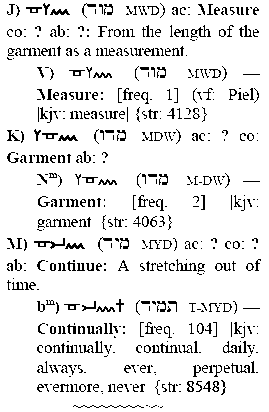| Does Ellen White write the Hebrew "the Daily" with correct meaning?
Q4:
Does Ellen White write the Hebrew "the Daily" with correct meaning?

(6) : "Tamiyd" : "Continual".
Hypothesis: Did Ellen White write Ancient Hebrew thought as inspired by the Holy Spirit commenting on the Hebrew word "tamiyd"?
Introduction: The daily is a strong word in Scripture, and many theologians have different opinions to what this Hebrew word means.
 Strong's 8548. "continual"
Strong's 8548. "continual"
The meaning in Ancient Hebrew reads "The marked flow with active hands through the door"
Other related words from Jeff Benner: “Water at the door” in Nomadic times a bowl of water was at the entrance to the tent so one could wash their feet before waking on the carpets. Strong 4055.
“The flow at the door swings” – to measure. Strong 4058.
The "tamiyd" comes from the idea of "garments" used to measure time, or cover things, for things washed before entering the door. Notice "The marked flow with active hands through the door".
Zec 13:6 And one shall say unto him, What are these wounds in thine hands? Then he shall answer, Those with which I was wounded in the house of my friends
The marked hands that flow through the door of our soul, speaks of a symbolic reference to Jesus, our High Priest allowing us entrance into His ministry.

{EW 74.1} Then I saw in relation to the "daily" (Daniel 8:12) that the word "sacrifice" was supplied by man's wisdom, and does not belong to the text, and that the Lord gave the correct view of it to those who gave the judgment hour cry.
{AA 50.1} For the "daily" baptism of the Spirit every worker should offer his petition to God.
{CCh 347.6} As Christ's ministration was to consist of two great divisions, each occupying a period of time and having a distinctive place in the heavenly sanctuary, so the typical ministration consisted of two divisions, the "daily" and the yearly service, and to each a department of the tabernacle was devoted. As Christ at His ascension appeared in the presence of God to plead His blood in behalf of penitent believers, so the priest in the daily ministration sprinkled the blood of the sacrifice in the holy place in the sinner's behalf. {CCh 347.7}
Notice the entrance into God’s tent is both washing with water (daily baptism of the Holy Spirit through prayer), and washing with blood,(daily sacrifice of sinners through Jesus of self for His power instead) across the measurement of time.

Discussion:
Testing the daily with Ellen White passages:-
As Christ at His ascension appeared in the presence of God to plead His blood in behalf of penitent believers, so the priest in the daily ministration sprinkled the blood of the sacrifice in the holy place in the sinner's behalf. {CCh 347.7}
The blood of Jesus is daily applied to the holy place on behalf of the sinner, as what this Ancient Hebrew word means "the continual".
Every morning and evening a lamb of a year old was burned upon the altar, with its appropriate meat offering, thus symbolizing the daily consecration of the nation to Jehovah, and their constant dependence upon the atoning blood of Christ....He says, "I beseech you therefore, brethren, by the mercies of God, that ye present your bodies a living sacrifice, holy, acceptable unto God, which is your reasonable service." . . . {FLB 196.4}
Notice the correct understanding of "Tamiyd" the continual, and how this continual flow of forgiveness and powers comes to us via Jesus from the Father because of His Son's sacrifice on our behalf.
Those who make a profession of faith, and yet remain unchanged in habit and practice, are represented in the parable by the man who came to the feast without a wedding garment. There are many who, while they believe what they read about Christ, do not believe in Christ. They do not receive Him as a personal Saviour. Their names may be registered on the Church roll, but they do not bring Christ into the daily life; and God can not accept them. {RH, February 26, 1901 par. 8}
In this example the "daily" is a symbol of the wedding garment, that is put on continually by sinners seeking a power flow continually from Jesus.

Ellen White theme


|
|
 See for more themes.
See for more themes.